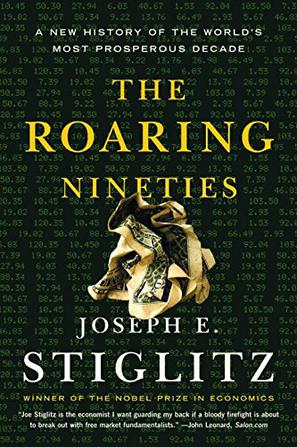A Nobel Prize-winning economist and author of Globalization and Its Discontents challenges perceptions about financial theories stemming from the apparent prosperity of the 1990s, noting such factors as reduced accounting standards and deregulation that caused the economic problems of today. Reprint. 50,000 first printing.
Publisher Comments:
"The Roaring Nineties offers not only an insider's illuminating view of policymaking but also a compelling case that even the Clinton administration was too closely tied to the financial community--that along with enormous economic success in the nineties came the seeds of the destruction visited on the economy at the end of the decade. The paperback includes a new introduction that reviews the continued failure of the Bush administration's policies, which have taken a bad situation and made it worse.
Synopsis:
Stiglitz offers not only an insider's illuminating view of policymaking but also alleges that even the Clinton administration was too closely tied to the financial community--that along with enormous economic success in the nineties came the seeds of the destruction visited on the economy at the end of the decade.
From Publishers Weekly
As an economic adviser to President Clinton and a World Bank official, Nobel Prize winner Stiglitz (Globalization and Its Discontents) had a front-row seat for the financial boom of the 1990s. He discusses how, contrary to all theory, reducing the national deficit led to the economic upswing, but his interest lies not in how the bubble happened but in those qualities that eventually led to its collapse. One of his chief arguments is that although efficient markets depend upon the free flow of information, deregulation enabled corporations like Enron to present distorted financial data, "stealing money from their unwary shareholders" in the process. Financial analysts also withheld frank assessments from investors to maintain their insider status, and the "conflicts of interest gone out of control" inevitably led to disaster. The book suggests Federal Reserve chairman Alan Greenspan could have slowed things down, but failed to back up tentative public remarks with firm action. The Clinton administration also comes in for some of the blame for pressuring foreign countries to adopt policies it wouldn't apply to its own economy. But the largest portion of the blame is doled out to George W. Bush for mishandling the initial stages of the recession, allowing it to spiral dangerously in the name of free markets. Instead, Stiglitz calls for just enough regulation to promote what he dubs "Democratic Idealism," a fairly standard liberal platform of social justice and economic reform. Whatever one thinks of his long-term goals, the straightforward and well-reasoned summation of the last decade's market trends has a convincing ring of truth.
From Booklist
Stiglitz, a Nobel Prize-winning economist and academic who served in the Clinton administration, reflects on his experiences in Washington and what he learned there. Among his many themes, he declares his beliefs that government should play a major (if limited) oversight role in the markets and that it should be an advocate for social justice. He feels that the rule of finance in the 1990s was supreme and government deferred too much to Wall Street; the prosperity and growth of that decade laid the foundation for today's economic problems, including too much deregulation, inadequate accounting standards, and pandering to corporate greed. Issues of globalization concern him greatly, and he analyzes the current situation in America and other developed countries and suggests future action. Although critical of Clinton-era policies, he reserves much harsher analysis for both Bush administrations. Stiglitz believes that citizens must understand the basic issues confronting our society and the way their government works; this book^B is an excellent primer.
Mary Whaley
Book Dimension
Height (mm) 212 Width (mm) 142
 The Roaring Ninetiestxt,chm,pdf,epub,mobi下载
The Roaring Ninetiestxt,chm,pdf,epub,mobi下载 首页
首页



希望不会让我失望。
什么也不说了
出新了自然都买
历史开始于人创造神,终结于人成为神